English bourgeois revolution кратко
Обновлено: 07.07.2024
The 17th century was one of the stormiest periods of English history. The political situation in the country was complicated. The growing contradictions between the new class, the bourgeoisie and the old forces of feudalism brought about the English Bourgeois Revolution in the 1640s. As a result of the revolution, the king was dethroned and beheaded and England was proclaimed a republic. Though very soon monarchy was restored, the position of the bourgeoisie had changed. The 18th century saw Great Britain rapidly growing into a capitalist country. It was an age of intensive industrial development. New machinery was invented that turned Britain into the first capitalist power of the world. The 18th century was also remarkable for the development of science and culture. English painting began to develop too.
Daniel Defoe (1661-1731) is regarded as the founder of realistic novel in English and European literature.
Daniel Defoe's life was complicated and adventurous. He was the son of a wealthy London butcher and received a good education. His father, being a puritan, wanted his son to become a priest. He preferred, however, the life of a merchant. He travelled in Spain, Germany, France and Italy on business. He spoke half a dozen languages and was a man of wide learning. From 1694 Defoe took an active part in public affairs. His energy enabled him to combine the life of a man of action with that of a writer. He was the earliest literary journalist in England. He wrote political pamphlets on any subject and every event. He was a man of an active and original mind, an independed and courageous thinker who dealt with social questions.
The greatest of the prose satirists of the age of the Enlightenment was Jonathan Swift (1667-1745). His bitter satire was aimed at the policy of the English bourgeoisie towards Ireland. That's why Irish people considered Swift their champion in the struggle for the welfare and freedom of their country.
Henry Fielding (1707-1754), born at Sharpham Park in Somerset, the son of a lieutenant. When he was 11, Fielding was sent to Eton. At the age of 19 Fielding tried to make a living in London as a dramatist.
In1728 his play "Love in Several Masques" was successfully performed at "Drury Lane" and Fielding departed for university at Leyden, where he studied classical literature for about 18 months. On his return to London he continued his carrer as a dramatist, writing some 25 plays in the period 1729-37. His dramatic works are largely satirical, the most satirical being "Tom Thumb" (1730). Fielding also edited four periodicals, but his major achievment is as a novelist.
The greatest poet of the 17th century was Robert Burns (1759-1796). His popularity in Scotland is very great. The Scottish bard was born in a clay cottage in the village of Alloway. His father was a poor farmer, but a man who valued knowledge. It was from his father that Robert received his learning and his love for books. His mother had a beautiful voice and taught Robert old Scottish songs and ballads which he later turned into his best poems.
In his songs he spoke of what he saw - of the woods and fields and valleys, on the deer and the skylark and the small field- mouse, of the farmer's poor cottage.
The 17th century was one of the stormiest periods of English history. The political situation in the country was complicated. The growing contradictions between the new class, the bourgeoisie and the old forces of feudalism brought about the English Bourgeois Revolution in the 1640s. As a result of the revolution, the king was dethroned and beheaded and England was proclaimed a republic. Though very soon monarchy was restored, the position of the bourgeoisie had changed. The 18th century saw Great Britain rapidly growing into a capitalist country. It was an age of intensive industrial development. New machinery was invented that turned Britain into the first capitalist power of the world. The 18th century was also remarkable for the development of science and culture. English painting began to develop too.
Daniel Defoe (1661-1731) is regarded as the founder of realistic novel in English and European literature.
Daniel Defoe's life was complicated and adventurous. He was the son of a wealthy London butcher and received a good education. His father, being a puritan, wanted his son to become a priest. He preferred, however, the life of a merchant. He travelled in Spain, Germany, France and Italy on business. He spoke half a dozen languages and was a man of wide learning. From 1694 Defoe took an active part in public affairs. His energy enabled him to combine the life of a man of action with that of a writer. He was the earliest literary journalist in England. He wrote political pamphlets on any subject and every event. He was a man of an active and original mind, an independed and courageous thinker who dealt with social questions.
The greatest of the prose satirists of the age of the Enlightenment was Jonathan Swift (1667-1745). His bitter satire was aimed at the policy of the English bourgeoisie towards Ireland. That's why Irish people considered Swift their champion in the struggle for the welfare and freedom of their country.
Henry Fielding (1707-1754), born at Sharpham Park in Somerset, the son of a lieutenant. When he was 11, Fielding was sent to Eton. At the age of 19 Fielding tried to make a living in London as a dramatist.

In1728 his play "Love in Several Masques" was successfully performed at "Drury Lane" and Fielding departed for university at Leyden, where he studied classical literature for about 18 months. On his return to London he continued his carrer as a dramatist, writing some 25 plays in the period 1729-37. His dramatic works are largely satirical, the most satirical being "Tom Thumb" (1730). Fielding also edited four periodicals, but his major achievment is as a novelist.
The greatest poet of the 17th century was Robert Burns (1759-1796). His popularity in Scotland is very great. The Scottish bard was born in a clay cottage in the village of Alloway. His father was a poor farmer, but a man who valued knowledge. It was from his father that Robert received his learning and his love for books. His mother had a beautiful voice and taught Robert old Scottish songs and ballads which he later turned into his best poems.
In his songs he spoke of what he saw - of the woods and fields and valleys, on the deer and the skylark and the small field- mouse, of the farmer's poor cottage.
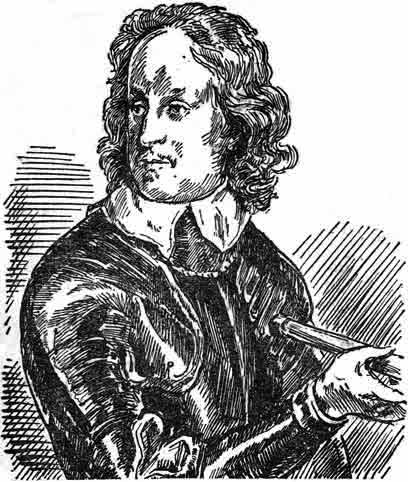
The struggle of Parliament against the king, began in England in the 12th century. Each king wanted to rule over the country without any parliament.
King Charles I was at war with Spain and France and wanted money for it. The Parliament refused to give the money. King Charles I dismissed the Parliament (1629) and for eleven years ruled over the country without the council of the people.
The Parliament assembled again only in 1640 and opposed the king. The parties began to prepare for war. The king and his soldiers were in Oxford. The soldiers of the Parliament with Oliver Cromwell at the head were in London. In the Civil War which lasted for twelve years the Parliament won the victory.
King Charles I was executed as enemy of the country. The Commonwealth was proclaimed and Oliver Cromwell became the Protector of the new republic. The end of the Commonwealth came after Cromwell died (1658). England was at war with Spain at that time. The government was too weak and the new Parliament decided to have a king.
In June 1665 the greatest epidemic of the Bubonic Plague broke out in London. Bubonic Plague was known as "the Black Death" and has been known in England for centuries. That year many people died of this disease. Most of the population left London and the streets were empty. This epidemic could not be stopped till December. This short period from June to December turned out a real tragedy for Londoners.
The Great Fire of London
A year later after the Plague, in 1666 a great tragedy happened again. The Great Fire broke out in September. The fire began late at night not far from London Bridge.
Most of the houses in London were built of wood at that time and streets were narrow. So, a hot wind spread the fire so that it could not be stopped for 5 days.
Sir Christopher Wren, the famous architect, took part in rebuilding the city. After the fire a lot of houses were destroyed and there were many homeless people. To remind people of this catastrophy the Monument was erected on the spot where the fire had started. Of course, this fire was a tragedy. Nevertheless, the fire burnt out the streets where the plague spread a year before.
The English Bourgeois Revolution. Oliver Cromwell
King Charles I did not like the idea of Parliament, so he dismissed it in 1629. He ruled the country without any Parliament for eleven years.
Only in 1640 the Parliament assembled again. And the Civil War bagan between the Parliament and the King. It lasted for 12 years and the Parliament won the victory. Oliver Cromwell was at the head of the Parliament at that time.
Then King Charles was executed because he was declared an enemy of the country. So, Oliver Cromwell became the Lord-Protector of the new republic.
However, after his death the government could not rule the country and the Parliament decided to have a king again.
Chartism
In the 19th century Great Britain was developing fast. There were many factories all around the country. But still a lot of workers were unemployed. However, those who found some job had to work for 16 hours a day. To fight for their rights the workers joined Trade Unions.
Everything what they demanded was written in the document called People's Charter. This document was sent to many factories with lots of workers. They signed it. But when People's Charter was sent to the House of Commons, it was rejected.
The workers organised many strikes all over the country. Many of them were arrested and sent to prisons.
The first national political movement of workers in Great Britain was called Chartism.
Слайды и текст этой презентации
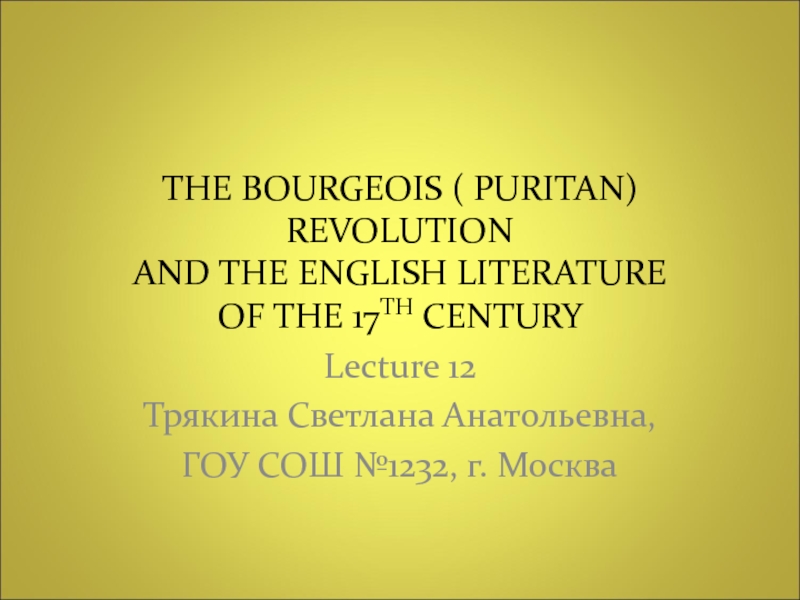
THE BOURGEOIS ( PURITAN) REVOLUTION AND THE ENGLISH LITERATURE OF THE 17TH CENTURY
Lecture 12
Трякина Светлана Анатольевна,
ГОУ СОШ №1232, г. Москва

The 17th century is a period, during which England had her own course both in her political and literary life.
After Queen Elizabeth’s death James VI of Scotland became King James I of England in 1603.
Like Elizabeth, he tried to rule without Parliament as much as possible. He believed in the divine right of kings. He expressed his opinion openly and that led to trouble with Parliament.
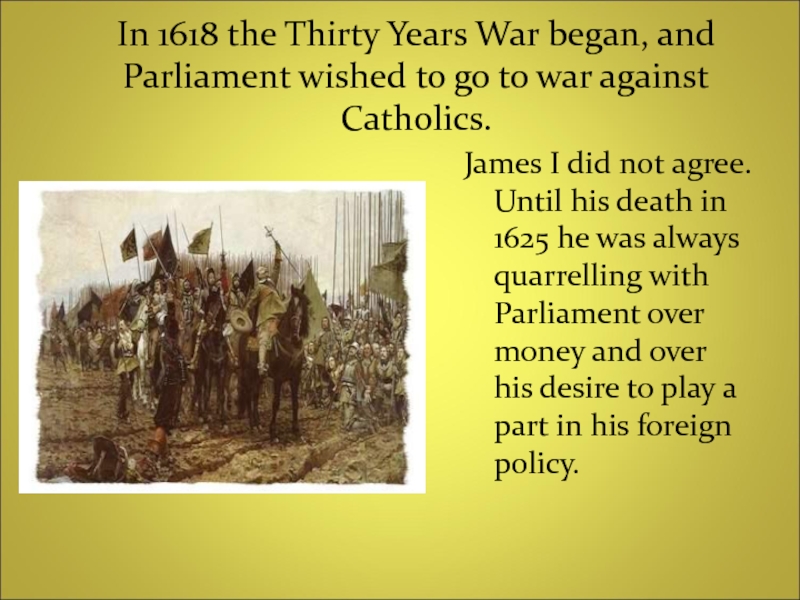
In 1618 the Thirty Years War began, and Parliament wished to go to war against Catholics.
James I did not agree. Until his death in 1625 he was always quarrelling with Parliament over money and over his desire to play a part in his foreign policy.
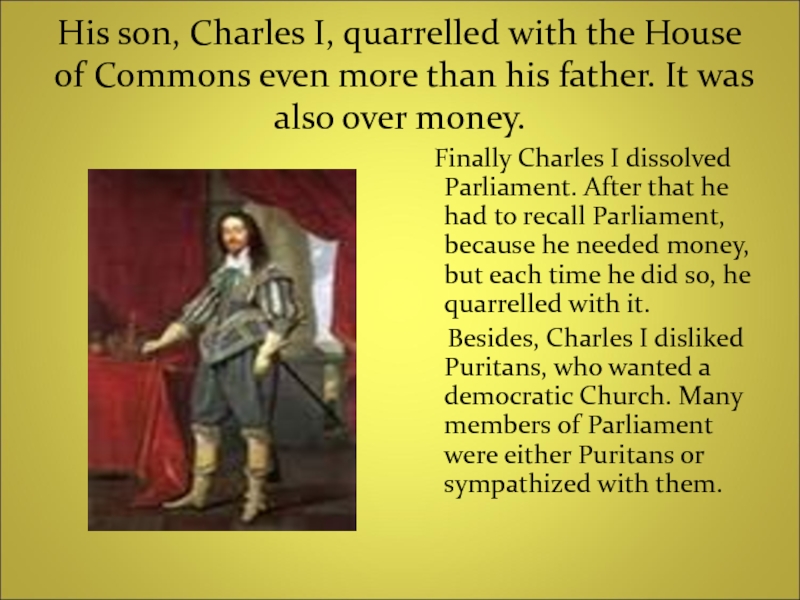
His son, Charles I, quarrelled with the House of Commons even more than his father. It was also over money.
Finally Charles I dissolved Parliament. After that he had to recall Parliament, because he needed money, but each time he did so, he quarrelled with it.
Besides, Charles I disliked Puritans, who wanted a democratic Church. Many members of Parliament were either Puritans or sympathized with them.

Puritans were serious Christian believers, who wanted to purify their religion of the formal ceremonies of the Church of England. They condemned singing, dancing, going to the theatre, all popular amusements and pastimes.
The CivilWar between Charles I and his supporters ( the Cavaliers) and the Parliament forces ( the Rounheads) began in 1642.
Victory went to Parliament at the end. Charles I was executed in 1649.
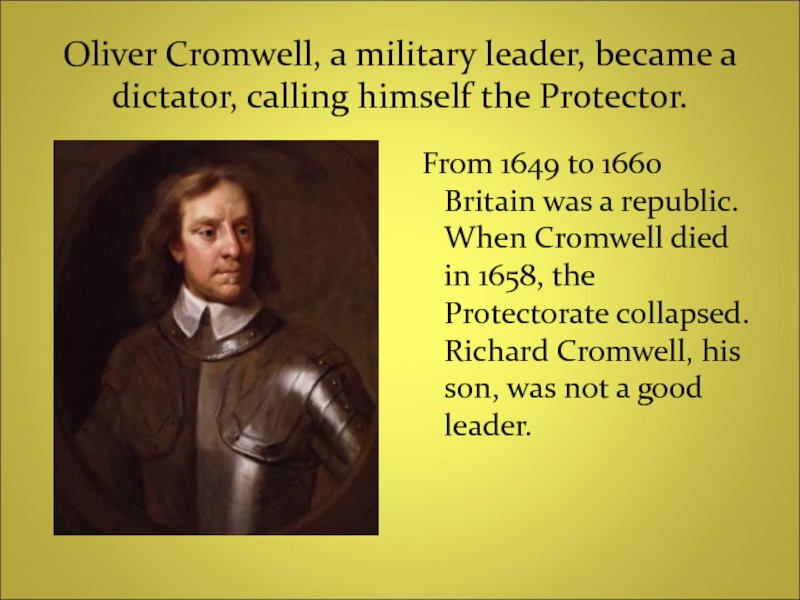
Oliver Cromwell, a military leader, became a dictator, calling himself the Protector.
From 1649 to 1660 Britain was a republic. When Cromwell died in 1658, the Protectorate collapsed. Richard Cromwell, his son, was not a good leader.
In 1660 Charles II was invited to return from France, where he had escaped after his father’s execution.
The republic was over, the monarchy was restored. The Restoration of Monarchy brought about many changes.
France was a great power at that time, so French influence in manners, literature and arts was now irresistible. What was fashionable in Paris, soon became fashionable in London.
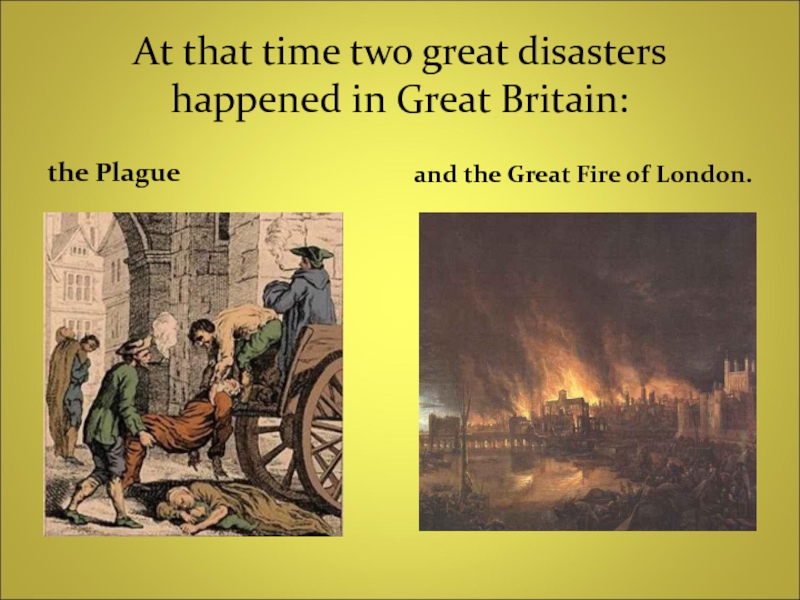
At that time two great disasters happened in Great Britain:
and the Great Fire of London.
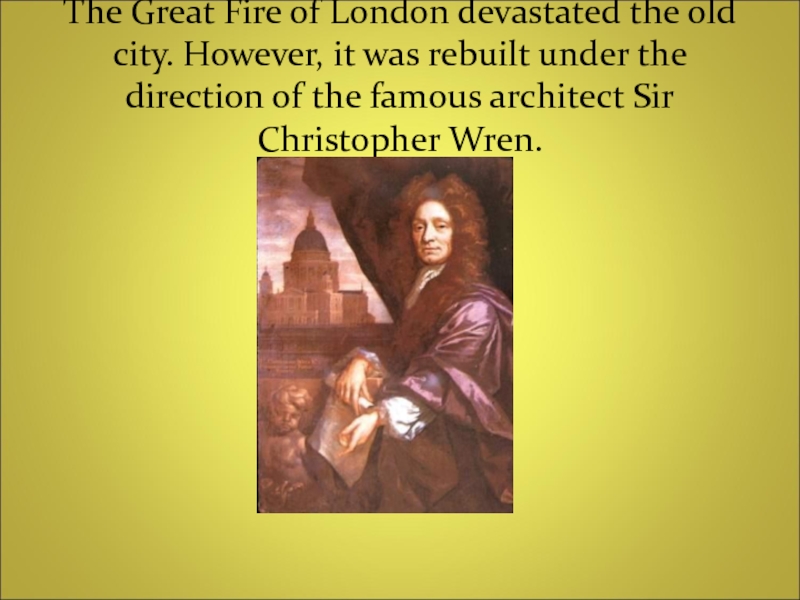
The Great Fire of London devastated the old city. However, it was rebuilt under the direction of the famous architect Sir Christopher Wren.
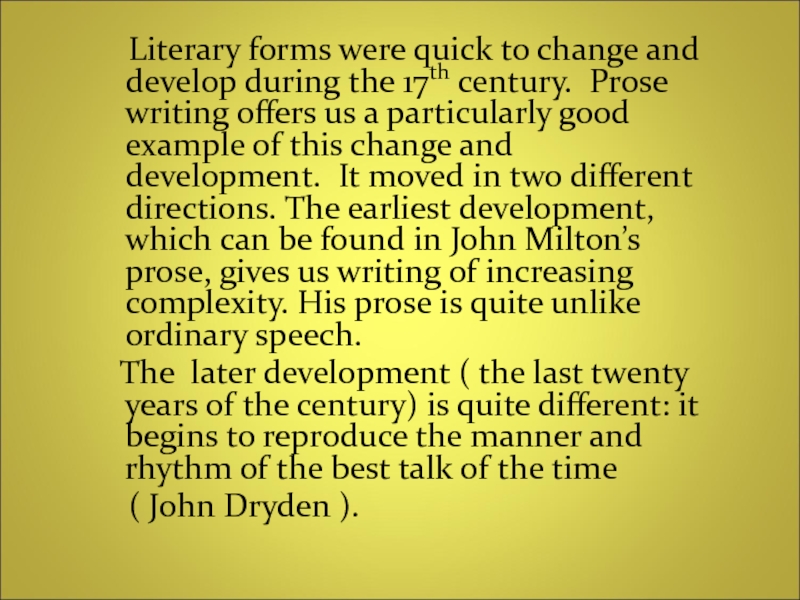
Literary forms were quick to change and develop during the 17th century. Prose writing offers us a particularly good example of this change and development. It moved in two different directions. The earliest development, which can be found in John Milton’s prose, gives us writing of increasing complexity. His prose is quite unlike ordinary speech.
The later development ( the last twenty years of the century) is quite different: it begins to reproduce the manner and rhythm of the best talk of the time
( John Dryden ).

John Milton (1608 -1674)
John Dryden (1631 -1700)
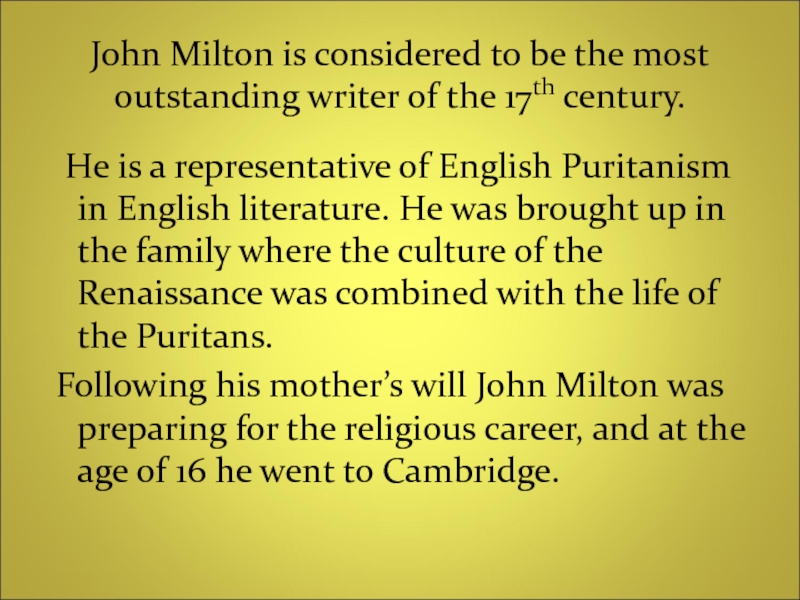
John Milton is considered to be the most outstanding writer of the 17th century.
He is a representative of English Puritanism in English literature. He was brought up in the family where the culture of the Renaissance was combined with the life of the Puritans.
Following his mother’s will John Milton was preparing for the religious career, and at the age of 16 he went to Cambridge.
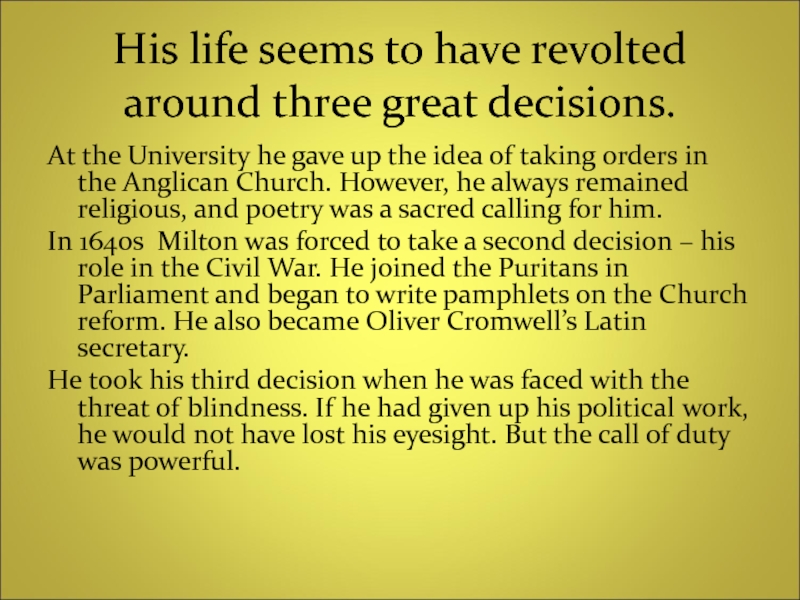
His life seems to have revolted around three great decisions.
At the University he gave up the idea of taking orders in the Anglican Church. However, he always remained religious, and poetry was a sacred calling for him.
In 1640s Milton was forced to take a second decision – his role in the Civil War. He joined the Puritans in Parliament and began to write pamphlets on the Church reform. He also became Oliver Cromwell’s Latin secretary.
He took his third decision when he was faced with the threat of blindness. If he had given up his political work, he would not have lost his eyesight. But the call of duty was powerful.

At the age 0f 44 John Milton went completely blind.
During the last 10 years of his life Milton completed his great long poems:”Paradise Lost” and “Paradise Regained”. He often dictated them to his daughters.
The poem “Paradise Lost” (1658, published in 1667) is the most famous of his poems. It tells in 12 books the Biblical story of the temptation and fall of Man in the hands of Satan.

The poetry of the 17 th century shows an astonishing variety.
John Donne (1572 -1631) was the greatest metaphysical poet. He was brought up as a Roman Catholic but later joined the Church of England and became Dean of St Paul’s Cathedral. His sermons were very popular, but he had a great influence as a poet. He glorified inconstancy and explored the dark paths of the mind.
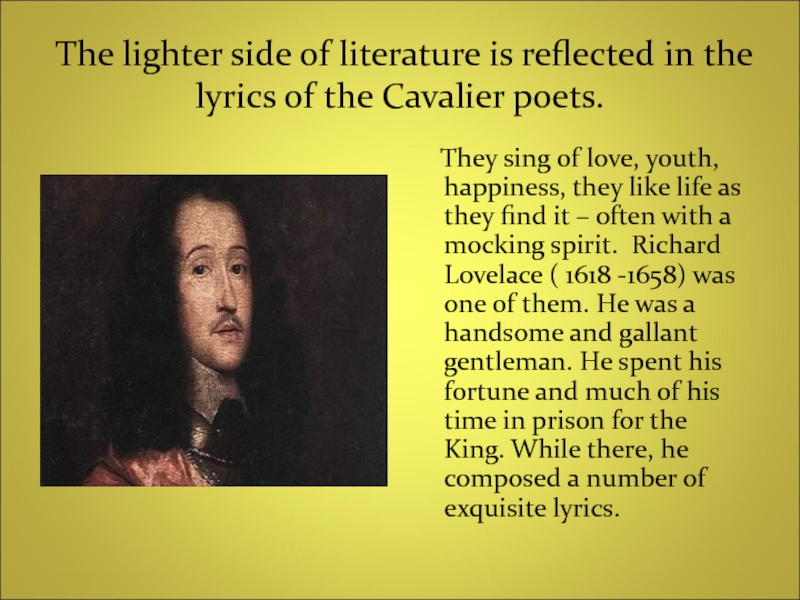
The lighter side of literature is reflected in the lyrics of the Cavalier poets.
They sing of love, youth, happiness, they like life as they find it – often with a mocking spirit. Richard Lovelace ( 1618 -1658) was one of them. He was a handsome and gallant gentleman. He spent his fortune and much of his time in prison for the King. While there, he composed a number of exquisite lyrics.
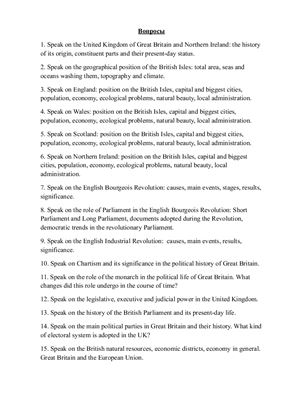
ПГУ, Пенза, 2015 год.
Файл содержит 22 кратких ответа к экзамену по страноведению (Великобритания). В тексте присутствуют сокращения, так как материал рассчитан на использование в качестве шпаргалки (Печать - Масштаб - Число страниц на листе - 4).
Speak on the United Kingdom of Great Britain and Northe Ireland: the history of its origin, constituent parts and their present-day status.
Speak on the geographical position of the British Isles: total area, seas and oceans washing them, topography and climate.
Speak on England: position on the British Isles, capital and biggest cities, population, economy, ecological problems, natural beauty, local administration.
Speak on Wales: position on the British Isles, capital and biggest cities, population, economy, ecological problems, natural beauty, local administration.
Speak on Scotland: position on the British Isles, capital and biggest cities, population, economy, ecological problems, natural beauty, local administration.
Speak on Northe Ireland: position on the British Isles, capital and biggest cities, population, economy, ecological problems, natural beauty, local administration.
Speak on the English Bourgeois Revolution: causes, main events, stages, results, significance.
Speak on the role of Parliament in the English Bourgeois Revolution: Short Parliament and Long Parliament, documents adopted during the Revolution, democratic trends in the revolutionary Parliament.
Speak on the English Industrial Revolution: causes, main events, results, significance.
Speak on Chartism and its significance in the political history of Great Britain.
Speak on the role of the monarch in the political life of Great Britain. What changes did this role undergo in the course of time?
Speak on the legislative, executive and judicial power in the United Kingdom.
Speak on the history of the British Parliament and its present-day life.
Speak on the main political parties in Great Britain and their history. What kind of electoral system is adopted in the UK?
Speak on the British natural resources, economic districts, economy in general. Great Britain and the European Union.
Speak on the population and demographical problems in Great Britain.
Speak on education in Britain: primary, secondary and higher education, educational stages, examinations, standards.
Speak on mass media in the UK: history, present day, problems.
Speak on the British traditions and holidays.
Speak on your understanding of the "national character". How is this notion reflected in the British culture?
Speak on the Celtic and Anglo-Saxon invasions: dates, stages, consequences.
Speak on the Scandinavian and Norman invasions: dates, stages, consequences.
Читайте также:

